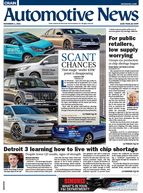The House late Friday passed the biggest U.S. infrastructure package in decades, marking a victory for President Joe Biden and unleashing $550 billion of fresh spending, including $7.5 billion for electric vehicle charging stations and $65 billion for upgrades to the nation's electric grid.
The vote was 228-206 and sends the legislation to Biden for his signature. Thirteen Republicans supported the bill and six Democrats voted against it, a sign of the intraparty strains that nearly derailed the legislation. It would not have passed without GOP votes.
Passage capped a day in which Speaker Nancy Pelosi was forced to deal with a last-minute standoff between party progressives and moderates that took hours of intense negotiations and the president's intervention to resolve.
The president, in a statement early Saturday, called the bill's passage "a monumental step forward as a nation."
Pelosi and Biden, however, were unable to land a House vote at the same time on the $1.75 trillion Build Back Better Act that makes up much of the rest of Biden's domestic agenda, including a controversial bonus tax credit for union-built EVs. Automakers with U.S. factories that are not unionized, including Volkswagen Group of America and Toyota Motor North America, have publicly called the union-friendly incentive unfair.
The House instead approved a procedural measure teeing up a vote after lawmakers return from next week's break and the Congressional Budget Office delivers a cost analysis.
That was a last-minute concession to a small group of moderates who refused to vote for the spending package without the CBO score. Progressives also made a concession by supporting the infrastructure legislation before a vote on the larger spending package.
Ford Motor Co. applauded the passage, saying an emailed statement: "Last night's vote is great news for the United States' infrastructure and transition to a zero emissions transportation future. ... We look forward to seeing this bipartisan investment signed into law by President Biden and continuing to work with our government partners to combat climate change, make it easier for people to move, and support American workers and manufacturing."
UAW President Ray Curry said in an emailed statement he is encouraged by passage of the procedural rules for the Build Back Better Act: "We now look forward to swift passage by the U.S. House of the BBBA along with the Kildee/Stabenow Provision that when paired with this infrastructure bill will ensure that consumer EV subsidies for new EV products will be made in the United States by workers who have good paying union jobs."






